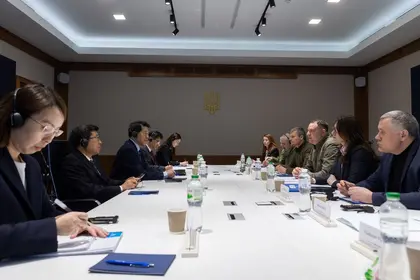A Chinese delegation, headed by Special Representative for Eurasian Affairs, Li Hui, arrived in Kyiv on March 7 before departing later the same day. He was hosted and briefed on Russia’s war in Ukraine by the Head of the Presidential Office, Andriy Yermak.
This was the latest stop in Li’s “shuttle diplomacy” visit, similar to that last year, in hopes to identify potential peaceful resolutions to what Beijing called the “Ukrainian crisis.”
JOIN US ON TELEGRAM
Follow our coverage of the war on the @Kyivpost_official.
A recent Kyiv Post article explained the background to the Chinese “shuttle diplomacy” tour in detail.
Ukraine’s perspective
According to the official Ukrainian press release, Ukrainian officials briefed the Chinese delegation “on the situation on the battlefield, the functioning of the ‘grain corridor,’ the return of prisoners of war, the protection of the rights of civilian hostages, and the return of Ukrainian children deported by Russia.”
“We value our partnership with China and hope that today’s talks will be another step towards deepening and strengthening our relations,” Yermak said in his opening remarks.
During the briefing, Ukraine had also “shown samples of the wreckage of a downed North Korean missile” and raised concerns over Moscow’s use of components in its weapons that had been sourced from third countries.
Other officials also informed the Chinese delegation of the situation concerning nuclear safety and Kyiv’s attempts to return Ukrainian prisoners of war, civilian hostages and children, potentially with the help of China.

Xi, Putin Hold Video Call: Chinese State Media
“During the meetings, the parties discussed the prospects for establishing a just peace for Ukraine, restoring the territorial integrity and sovereignty of our country on the basis of the Ukrainian Peace Formula.
“They also discussed the possibility of China's assistance in putting an end to the forced deportation of Ukrainian children, in the exchange of prisoners, demilitarization and de-occupation of the Zaporizhzhia Nuclear Power Plant, guaranteeing nuclear security and other international initiatives of our country,” read the press release.
The Chinese press release
In comparison, the Chinese official press release consisted of three paragraphs that did not mention the subjects discussed.
The official press release (in translation) said:
“At noon on March 7, 2024, Li Hui, the Chinese government’s special representative for Eurasian affairs, arrived in Kyiv, the capital of Ukraine, by train to continue the second round of shuttle diplomacy on promoting a political solution to the Ukrainian crisis.
“Special Representative Li Hui held candid and friendly talks with the Head of President’s Office Yermak, Minister of Economy of Ukraine [Yuliia] Svyrydenko, and Foreign Minister [Dmytro] Kuleba on China-Ukraine relations and the Ukrainian crisis. Chinese Ambassador to Ukraine Fan Xianrong, Ukrainian Ambassador to China [Pavlo] Riabikin, Deputy Minister of Energy [Svitlana] Hrynchuk and others attended the meeting.
“In the evening of the same day, Special Representative Li Hui concluded his visit to Ukraine and left Kyiv by train,” it read.
Chinese response to meeting with Russian officials
In comparison, the press release following Li’s first stop in Moscow, after meeting Russian Deputy Foreign Minister Galuzin Mikhail Yuryevich, had a much more welcoming tone. Below are the excerpts of the statement:
“Noting that this year marks the 75th anniversary of the establishment of diplomatic relations between China and Russia, and also the beginning of the China-Russia Years of Culture, the two sides agreed that they should follow the fundamental guidance of the important common understandings reached by the two heads of state and push forward the continuous development of bilateral relations.
“Li Hui said that it has been two years since the full escalation of the Ukraine crisis. Historical experience shows that any conflict in the end has to be settled through negotiations. The more acute the conflict is, the more important it is not to give up efforts for dialogue. China is ready to continue its efforts to promote talks for peace, carry out shuttle diplomacy, mediate and build consensus among Russia, Ukraine, and other relevant parties, and promote a final political settlement of the Ukraine crisis,” it read.
Results of meetings between Li and EU officials
Li’s meeting with EU officials after his time in Moscow also hints at Beijing’s agenda for the visit - which may be more concerned with sanctions against Chinese entities.
From the press releases, it could be inferred that the meeting between the EU and Chinese officials did not go smoothly, with each side voicing their concerns likely without addressing the issues raised by their counterparts – it appeared as if both parties were talking to a wall.
Brussels’ press release emphasized the bloc’s stance against Russia’s invasion of Ukraine and that it perceived it as an “existential threat for its security.” EU officials also noted the use of Chinese components in Russian weapons and said “China's position on the war inevitably impacts [their] bilateral relationship,” ultimately expecting Beijing to pressure Moscow using its position.
It ended with a cold, formal conclusion: “Both sides agreed to remain in touch on these critical issues.”
The Chinese press release was also brief, claiming the two parties had “a candid and in-depth exchange of views on the crisis situation in Ukraine and the peace talks” without going into details, and concluded it with a paragraph that voices its opposition to EU sanctions:
“Li Hui also said that China firmly opposes the EU’s inclusion of Chinese enterprises in the latest list of sanctions against Russia, urging the EU to unconditionally cancel the listing of Chinese enterprises and return to the right track of dialogue and consultation with China,” it read.
As Li’s “shuttle diplomacy” tour continues, whether or not it will yield any results remains to be seen, but there are no signs of concrete progress for the time being.
You can also highlight the text and press Ctrl + Enter










